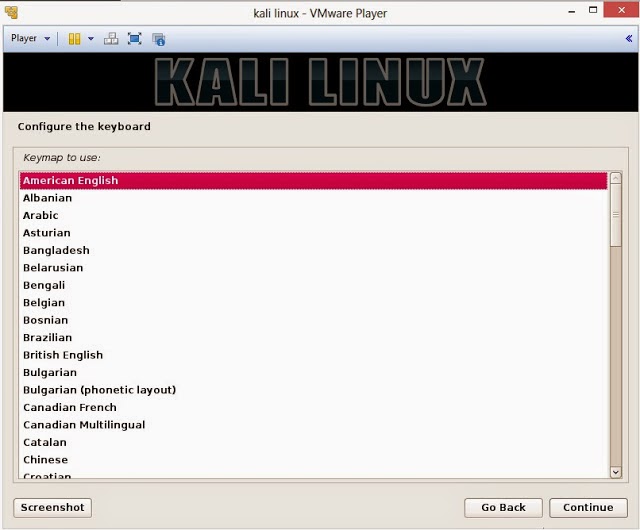Today, I'm going to guide you step by step to install Kali Linux in windows using virtual machine. Kali Linux is the best OS for penetration testing. Kali Linux is a Debian-derived Linux distribution designed for digital forensics and penetration testing. Kali has many advantages over the BackTrack. It comes with many more updated tools. The tools and streamlined with Debian repositories and synchronized four times a day. That means users have the latest package updates and security fixes. So now moving on to article i.e "How To Install Kali Linux/Backtrack On Windows [Step By Step Guide]"
How To Install Kali Linux/Backtrack On Windows :
Requirements :-
- A minimum of 8 GB disk space for the Kali Linux install.
- For i386 and amd64 architectures, a minimum of 512MB RAM.
- Download Kali linux ISO. [ Link ]
- Download VMware [ Link ]
Steps To Perform :-
Step 1: First of all install and open VMWare Workstation which you can downloag from the above provided link and after opening VMWare click on Click a New Virtual Machine. It will open New Virtual Machine Wizard.
Step 2: Now in the opened wizard select I will install the operating system later and the click onNext.
Step 3: In the next opened window select Guest operating system as Linux and then select Version as Ubuntu. Click on Next to goto next screen.
Step 4: Now type virtual machine name and specify the location where you want install Kali Linux.
Step 5: Now specify the disk capacity. Default is 20 GB. Select Split virtual disk into multiple filesand Click on Next.
Step 6: On next screen, either you can click on Customize Hardware to customize settings and then to go to step no. 8 or click on Finish to complete the process of creating virtual machine.
Step 7: Click on Edit virtual machine settings.
Step 8: This is the screen where you can customize or edit your Hardware Settings. As mentioned above, the minimum system requirement is uni-processor of i386 or amd64 architecture processor, so click on
(a) Memory, to select minimum 1024 MB of RAM.
(b) Processors, as 1 or 2 (depending upon the processing speed) and Preferred mode as Automatic.
(c) Click on CD/DVD IDE. Now, on right hand panel you will Connection. It has two options :
- Use physical drive- select this option if you have Kali Linux is in your CD or DVD drive.
- Use ISO image file- select this option if you have downloaded Kali Linux on your hard drive. Click on Browse to locate the ISO file.
(d) Floppy drive is optional, as now a days most of the computers do not floppy drive.
(e) Select NAT if you have network adapter for Internet.
Step 10: Now the VMWare setup will startup. Wait until it loads.
Step 11: Now the Kali Linux boot screen will appears. Choose either Graphical or Text-Mode install and press Enter to boot. Here I'm choosing Graphical Mode.
Step 12: After selecting your preferred language click on Continue.
Step 14: Now select option to configure your keyboard and click on Continue.
Step 15: Once disc is detected by operating system, it will copy the image to your hard disk and probe your network interfaces.
Step 16: Now the next step is to enter the hostname to configure your network and click onContinue.
Step 17: If you have a domain name, then enter here in the box.You can enter the domain name later and leave this box blank. Click on Continue.
Step 20: Now the next step is of partitioning the disk. Beginner can select Guided- use entire disk however experienced user can setup partition as Manual.
Step 21: Below are the screenshots of manual partition. I have created three partitions
- /boot (a partition from where your operating system will boot)
- / (root partition for super user or admin)
- swap (a portion where buffering is done)
Step 22: Now this is the screen where you will have last chance to review your disk configuration before the installer makes irreversible changes. After you click Continue, the installer will go to work. You are almost done.
Step 23: Configure network mirror to give additional software that is included on the CD-ROM and leave HTTP Proxy.
Step 26: You are done ! Now the Login screen of Kali Linux will appears on the screen and login using your password which you made earlier.












.jpg)


























Greetings from Ohio! I'm bored to death at work so I decided to browse your site on my iphone during lunch break.
ReplyDeleteI love the knowledge you present here and can't wait to take a look when I get
home. I'm surprised at how fast your blog loaded on my mobile ..
I'm not even using WIFI, just 3G .. Anyways, very good site!
Visit my web blog; vmware workstation with key